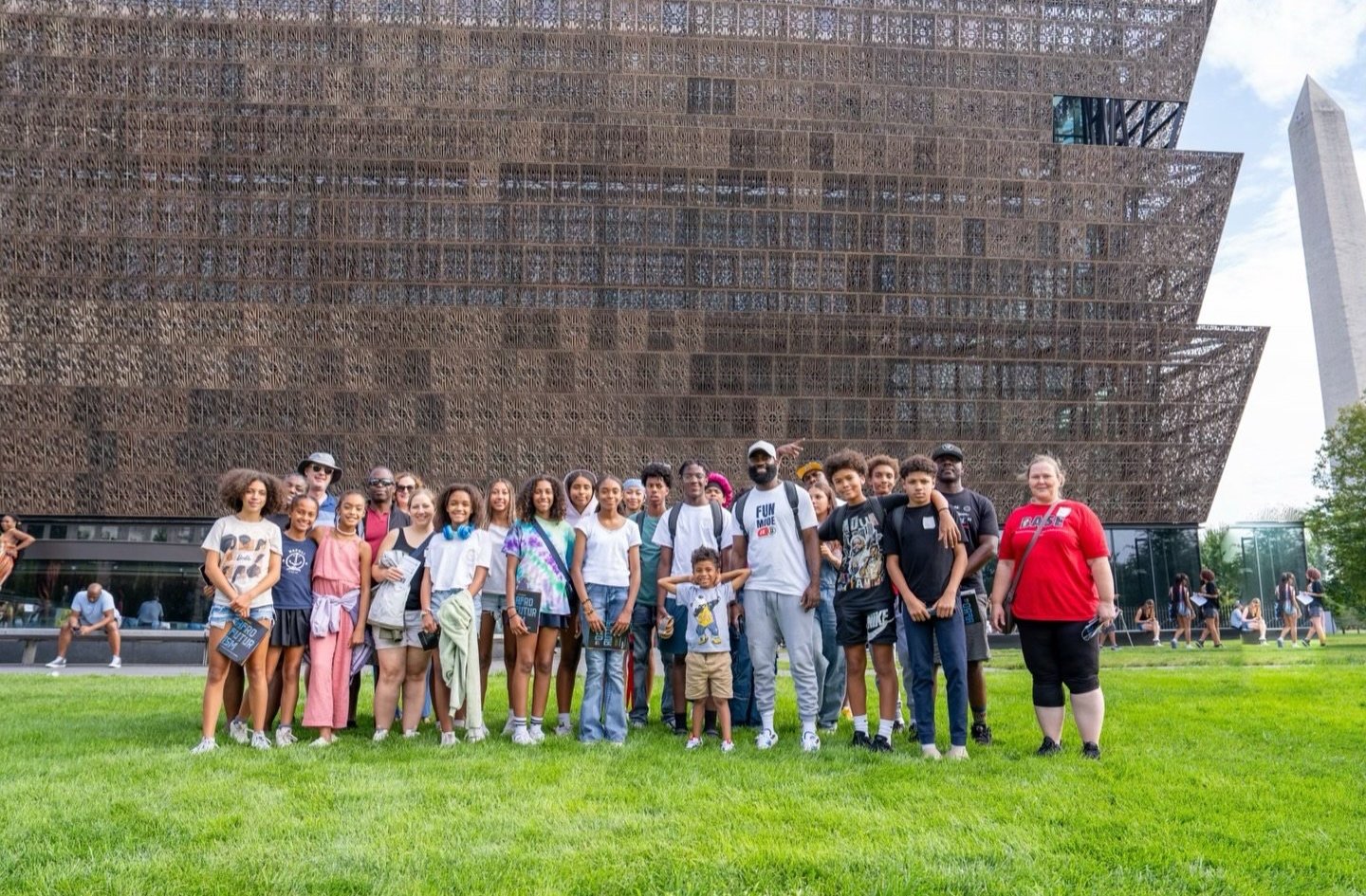BASE Celebrates Black Community and Culture in Southern Oregon
BASE Youth at the National Museum of African American History and Culture
There are a little over 4000 Black people living in Southern Oregon. As you might imagine, being Black in Southern Oregon can be an isolating experience. This is particularly true for Black youth in Southern Oregon, many of whom are adopted and/or mixed race.
Vance Beach understands this experience on a personal level. In 2007, Vance received a football scholarship from Southern Oregon University (SOU) and moved to Oregon from Arizona. He earned bachelor’s and master’s degrees from SOU, all the while navigating the reality of being a Black man in a mostly white region. Inspired to share his experience and ease the way for his fellow Black residents, Vance founded Black Alliance & Social Empowerment (BASE) in 2020.
BASE Southern Oregon’s goal “is to nurture the growth of a welcoming, visible, supportive, and thriving Black community that attracts new residents and enriches the lives of its current residents.”
BASE has done incredible work over the last four years. A few examples: They organized the first citywide Juneteenth and Kwanzaa celebrations in Medford Oregon. They created the only Black-owned business directory in the region. They hosted an art show at Rogue Gallery and co-created the “Say Their Names” art installation in Ashland.
With funding from the Justice Reinvestment Equity Program, BASE has embarked on efforts to reduce violence and prevent involvement in the criminal legal system.
Consider these numbers:
In 2022, Oregon ranked 37th in the U.S. for overall population of African American residents. Oregon’s Black population was just 2%, or 84,000 people.
Oregon ranks 7th in the U.S. for arresting and convicting Black people.
Black youth are overrepresented in the juvenile detention system at three times the rate of any other racial group.
Obviously, we have some work to do. And BASE isn’t shying away from the work. They’re approaching it in a couple different ways.
In the last couple years, BASE started BASE Boyz, a youth program supporting Black boys. A particular focus of the program is supporting boys transitioning from elementary to middle school, which is when Black boys begin to be perceived as a “threat” or “danger” to society. BASE aims to create a space where BASE youth can feel at home and share cultural experiences. The program runs year round, and they see the youth weekly, including after school activities, field trips, events and mentorship.
BASE has posted several youth programming success stories on social media. Here’s one example:
BASE BOYZ: A Journey of Growth with Dre
"Recently, we had the pleasure of spending an evening with Dre, one of the remarkable young men in our BASE Boyz program. We met at Dre’s favorite spot, El Paraiso Mexican Cuisine, where we shared a meal and engaged in deep, meaningful conversations about life, school, and his future.
Dre is entering seventh grade, and he’s determined to make it a successful year. During our time together, Dre shared his goals and the challenges he’s facing, particularly around building better relationships with his family and adapting to his new school environment. It’s clear that Dre is committed to his growth, not just academically but personally as well. His calm demeanor and improved communication with his mom and peers are signs of the progress he’s making.
One of Dre’s short-term goals is to complete seventh grade with flying colors, and his long-term dream is to become a professional mechanic. To support him in these ambitions, we talked about the importance of staying connected with his teachers and seeking feedback to improve. We’ve also discussed ways to keep his passion for mechanics alive, including participating in BASE’s workshops and classes, like the bike-building course at Talent Maker City, which Dre is excited to join.
But our support doesn’t stop at conversations—we’re here to help Dre with all aspects of his life. He loves riding his bike, and we’re going to make sure he gets it fixed so he can enjoy it again. And to ensure he stays on track, we’ll be checking in with Dre weekly to offer any additional support he needs.
Dre has come a long way, and we’re incredibly proud of his progress. His calmness, attentiveness, and willingness to grow are truly inspiring. At BASE, we’re committed to walking alongside Dre on this journey, providing the guidance, resources, and encouragement he needs to achieve his goals.
Stay tuned for more inspiring stories from our BASE Boyz program. Together, we’re not just building strong young men—we’re building a future where every boy has the confidence and support to become who they’re meant to be.
Police Liaison Committee monthly meeting
BASE also started a Racial Equity Police Liaison program. The program is led by a group of ten Black community leaders and professionals. It has three main goals:
To offer support and connect residents to resources in reporting racially motivated bias in the community.
To serve as a liaison with local law enforcement agencies in the county and be a voice for the community at large.
To advocate and advise on reform and transformation.
When the program first began, the majority of Black community did not want to engage with the police. Now they have partnerships with six Jackson County police departments and the Jackson County Sheriff, and community members ready to speak to this group every month. Every year, the Racial Equity Police Liaison Committee releases a report with social service and policing statistics, regardless of what the statistics show. In addition, the program facilitates annual public safety gatherings for community members to discuss the report, as well as the safety and well-being of residents. As a result, BASE hopes to see reporting of racially motivated incidents increase.
It’s so exciting to see BASE’s growth as an organization and their undeniable impact on the Southern Oregon community. We’re honored to have them in the JREP cohort.
The Justice Reinvestment Equity Program (JREP) supports culturally specific organizations and culturally responsive services in communities most harmed and least helped by Oregon’s criminal legal system. JREP seeks to elevate organizations that have been overlooked by traditional funding streams with the goals of reducing incarceration and racial disparities in the criminal legal system, promoting healing and advancing community safety in Oregon. Learn more about JREP.



